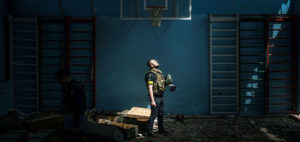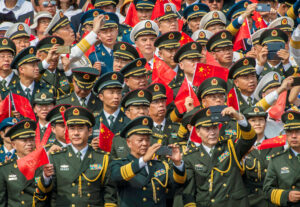Last June, a trio of uniformed Russian teens clutching a Soviet-era banner goose-stepped past a memorial to victims of Nazi fascism. Next to them, a dozen younger children stood awkwardly to attention as they watched soldiers and local politicians coat the memorial in fresh flowers. “The history of our country will never be forgotten,” announced a local functionary. “Never forget that you are citizens of a mighty nation!”
His audience — a gaggle of pre-teens — were about to be inducted into the Youth Army, the Russian state’s paramilitary youth group for children aged six and up. Founded by the Kremlin’s Ministry of Defence in 2016 as a means to prepare children physically, intellectually, morally, and “spiritually” for war, it now counts 1.3 million members and an annual state subsidy of $80 million. The inductees repeated, like the 300,000 other youths who joined the group in 2022, an oath of allegiance: “I swear to remain forever true to the Fatherland and to the Brotherhood of the Youth Army!”
This is a scene played out in hundreds of locations across the Russian Federation as the state seeks to militarise its young people by transforming them into warriors ready to do battle with internal traitors, as well as the West and Ukraine. New recruits spend their free time gathering humanitarian aid for refugees and the “evacuated” from Ukraine, learning about Russia’s historic military feats in the face of an aggressive West, meeting heroised “veterans” of Russia’s current war, and practising military skills — first aid, tactical exercises, and even live firing — to prepare them for conflict. These children are, as one Ukrainian commentator puts it, learning “to die for the Motherland”.
But this particular initiation did not take place in Russia, and these were not Russian children. These were Ukrainian children in occupied Mariupol. Just one month after the end of Russia’s brutal siege, which razed the town and left as many as 25,000 civilians dead, Russia kickstarted an indoctrination campaign to turn Ukraine’s children into Russian citizens and warriors. The Ukrainian state feared that the project would successfully feed yet more sacrificial bodies into an ailing Russian war machine.
After all, Youth Army members are told that Ukraine is a fascist nation that threatens to obliterate Russia — just as the Nazi invaders did in 1941. It’s no coincidence that the heavily publicised enlistment of these first dozen Mariupol “young soldiers”, as they are known, took place at a monument to the Soviet war effort, or that Mariupol’s “unit” was officially formed on May 9, the anniversary of the end of the Second World War. The speaker at the ceremony implored the young listeners to “follow in the footsteps” of past soldiers in “liberating our brother nation from fascism”.
After its illegal invasion and annexation of Crimea in 2014, the Russian government launched a wave of youth “re-education” projects that spanned changes to the school curriculum, the creation of “volunteer” projects for local youths, the reinstatement and recreation of Soviet-era monuments and rituals to war, and, in 2016, the creation of Youth Army “units” on the Crimean peninsula.
As of last summer, there were 11,000 “young soldiers” in Crimea. Hundreds take part in symbolic Victory Day parades, attend the newly founded “Crimean Patriots’ Centre” for military education, and spend parts of their summer at a local resort camp. At home, they might join one of the Youth Army’s social media groups, take part in online campaigns, download the “Young Soldier” app, and play patriotic games. Soon, they may join the army proper and imitate the dozens of former “young soldiers” from Crimea that are already fighting in the so-called “special military operation”.
In the recently occupied regions of Ukraine, potential recruits to the new Youth Army units are offered plenty of incentives. The patriotic Russian singer Shaman, a 31-year-old whose song “I am Russian” became a smash-hit after February 2022, visited Mariupol and Donetsk to perform in January of this year. Local Youth Army members were given front-row tickets. And if that doesn’t appeal, recruits can always interact online with the big-name influencers who spread the Youth Army’s message. The organisation is led by Nikita Nagornyy, a chisel-jawed 26-year-old Olympic gymnast, who counts hundreds of thousands of followers across the platforms he uses to spread a message of clean living, self-discipline, and military ideals. Those who enrol are also promised other sweeteners, including easier paths into top universities in Moscow and St. Petersburg, which promise good jobs and an escape from the day-to-day violence of the occupied regions.
When the carrot doesn’t work, the Russian state tries the stick. Ihor Solovey, Head of the Ukrainian government’s Centre for Strategic Communications and Informational Security, tells me that “Russia has taken its model of youth involvement in militaristic, ideological organisations from the Soviet Union” when participation in such groups was “voluntary-compulsory”. Ukraine’s children are told that: “You are in Russia. Russia is here forever. You must obey Russia.” That means taking part in military education — which is to become mandatory in every Russian school in September — “volunteering” for out-of-hours municipal projects, and joining groups like the Youth Army.
Throughout these programmes, the threat of aggression always looms in the background. Children report seeing Ukrainian flags burned in classrooms, being forced to sing the Russian national anthem, and experiencing vicious bullying. Those who still refuse to participate are denounced by teachers and administrators, and even targeted by their peers.
Meanwhile, Youth Army leaders in occupied regions have launched online campaigns to encourage their charges to spread the gospel of Russian salvation. Children, for example, post letters they have written to soldiers at the front on their social media feeds: “I, a Young Soldier of the Donetsk Youth Army, am taking part in the Letter to a Soldier campaign!” They upload videos hymning their Russian language teachers, their Youth Army leaders and Russia’s history. Backed up by slick marketing and an army of paid and volunteer social media influencers, the online message spreads from peer to peer: the Russian state is good, caring, and noble; the Ukrainian is an enemy.
The reality, of course, is quite the opposite. As Solovey explains, Russian propaganda emphasises that Ukrainian children are “infected with Russophobia” from which they need to be “cured”. The removal of visible symbols of Ukrainian identity — flags, language, town names and books — from Ukraine is thus matched by efforts to “cure” children through military re-education. Children are, according to official Russian statements, “saved” by the invasion. Destroying children’s identities, severing connections to their communities and turning them against their homeland is painted as pure benevolence.
Yet for the Ukrainian government, explains Solovey, the militarisation of children through organisations like the Youth Army is a war crime — to add to the crimes that Vladimir Putin has been charged with by the International Criminal Court. Putin, however, has more pressing concerns. Russia is wrestling with manpower issues as millennials flee the fighting. Following its flawed mobilisation last autumn, when hundreds of thousands of Russian men escaped the country, the Kremlin is now attempting to use digital tools to crack down on draft dodgers. But it is also working on indoctrinating its youngest subjects into militarism to prevent a repeat of the issue in the coming years. Hundreds of young Ukrainians in Mariupol, Donetsk and Zaporizhzhya have already been coaxed or forced into the ranks of the Youth Army.
And if the success of the Youth Army in its seven years of work in occupied Crimea is anything to go by, the numbers will grow as time goes on — and youngsters may become more likely to Russify themselves or even take up arms against Ukraine. If the Kremlin is planning a “forever war”, then its youngest subjects may prove more willing soldiers than wantaway millennials.
Disclaimer
Some of the posts we share are controversial and we do not necessarily agree with them in the whole extend. Sometimes we agree with the content or part of it but we do not agree with the narration or language. Nevertheless we find them somehow interesting, valuable and/or informative or we share them, because we strongly believe in freedom of speech, free press and journalism. We strongly encourage you to have a critical approach to all the content, do your own research and analysis to build your own opinion.
We would be glad to have your feedback.
Source: UnHerd Read the original article here: https://unherd.com/




